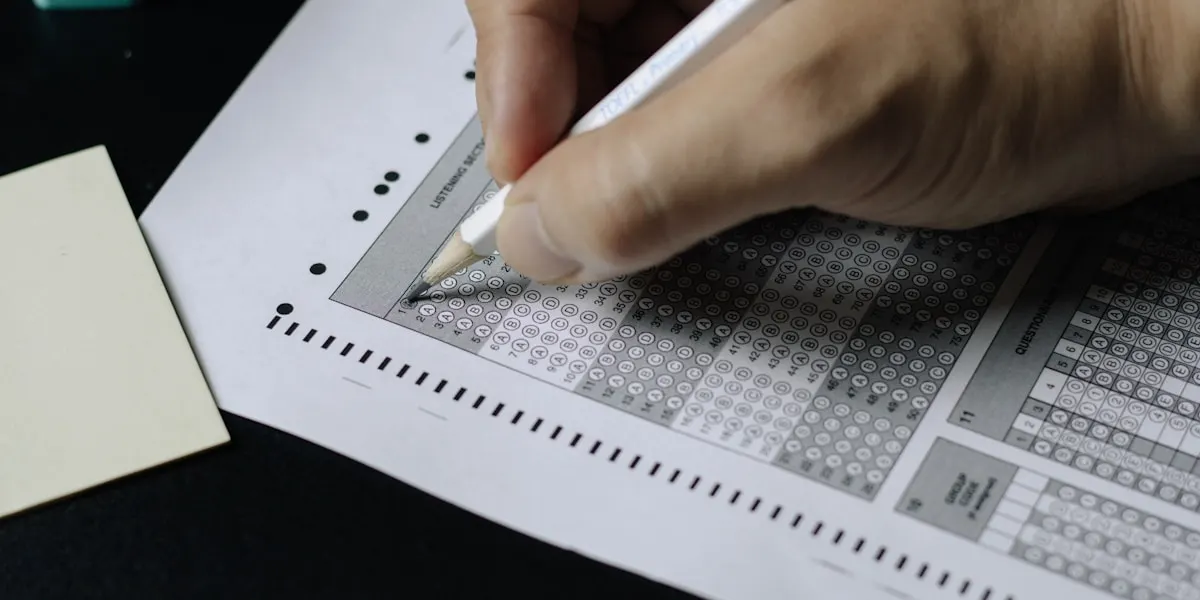Why Can't I Focus on Studying? Understanding the Doom Scrolling Epidemic
Picture this familiar scenario: You have an important exam tomorrow that could determine your academic future. You sit down with good intentions, textbooks open, highlighters ready, and your phone nearby "just in case." Fifteen minutes into studying for your exam, your concentration wavers. That complex biology concept or confusing mathematics problem triggers a mental roadblock. Almost unconsciously, your hand reaches for your phone—just for a quick break, you tell yourself.
Before you know it, you've spent 45 minutes doom scrolling through social media, news apps, and YouTube videos. That quick study break has sabotaged your entire study session. Your exam preparation is suffering, your anxiety about the upcoming test is increasing, and yet the cycle continues.
This pattern of doom scrolling while studying has become the number one enemy of effective exam preparation and a major reason why students struggle to concentrate. But why exactly do we fall into this focus-destroying habit when we need to study?
Top 5 Reasons Students Doom Scroll Instead of Studying
1. Passive Study Methods Create Boredom
Traditional study techniques like re-reading textbooks and highlighting notes are passive learning methods that fail to engage your brain. When your mind isn't actively processing information during exam preparation, it naturally seeks stimulation elsewhere—usually on your phone. This is one of the main reasons why you can't focus on studying for long periods.
2. Digital Distraction Has Rewired Our Focus
Our constant connectivity has trained our brains to crave quick dopamine hits from notifications and new content. When faced with challenging study material that requires deep concentration, many students experience digital withdrawal symptoms that make it nearly impossible to focus on studying without checking their phones.
3. Anxiety Avoidance Through Scrolling
Many students use doom scrolling as an unconscious strategy to avoid the anxiety of difficult exam preparation. When you're worried about passing your exam, the temporary escape of social media provides immediate relief—even though it ultimately makes focusing on studying more difficult and reduces your chances of exam success.
4. The Illusion of Productive Multitasking
Students often convince themselves that quickly checking messages or news while studying won't harm their concentration. This myth of effective multitasking during study sessions is one of the biggest barriers to developing good study habits and maintaining focus on studying.
5. Lack of Active Engagement With Study Material
When you're not actively engaging with what you're learning, your brain quickly loses interest. This passive approach to studying makes it extraordinarily difficult to concentrate and practically invites doom scrolling as an alternative to boring study sessions.
How to Stop Doom Scrolling and Start Focusing: Practical Study Tips for Better Concentration
If you want to pass your exams and improve your grades, you need effective strategies to combat doom scrolling and enhance your focus during study sessions. Here are proven techniques to help you concentrate while studying:
Create a Distraction-Free Study Environment to Maximize Focus
Your study space plays a crucial role in your ability to concentrate. Here's how to optimize it:
-
Physical Distance From Devices: The most effective way to stop doom scrolling is to physically separate yourself from your phone while studying. Research shows that having your phone in another room significantly improves your ability to focus on studying and retain information for exams.
-
Digital Study Barriers: If you need your computer for exam preparation, install website blockers like Freedom, Cold Turkey, or Forest to prevent access to distracting sites. These focus apps are essential study tools for modern students who want to concentrate better.
-
The Pomodoro Technique: This popular time management method is perfect for students who struggle to focus for long periods. Study intensely for 25 minutes, then take a 5-minute break. After four sessions, take a longer 15-30 minute break. This structured approach helps maintain concentration while studying and provides scheduled time for controlled phone use.
-
Environmental Cues: Create physical signals that tell your brain it's time to focus on studying. This might be a specific desk setup, study playlist, or even wearing particular "study clothes." These environmental triggers help your mind transition into deep concentration mode for effective exam preparation.
Transform Passive Reading Into Active Study Techniques
The secret to maintaining focus while studying is engaging actively with the material rather than passively consuming it. Here are the most effective study techniques for active learning:
1. Active Recall: The #1 Study Method to Improve Exam Performance
Active recall—forcing yourself to retrieve information from memory rather than simply re-reading it—is consistently rated as the most effective study technique by education researchers. Studies show that students who practice active recall are 50% more likely to pass exams compared to those using passive study methods.
How to implement active recall in your study routine:
- After reading a section, close your book and write down everything you remember
- Create practice questions based on your lecture notes
- Explain concepts out loud as if teaching someone else
- Use blank sheet method: cover your notes and recreate them from memory
2. Flashcards: Science-Backed Study Tools for Better Exam Results
Flashcards remain one of the most effective study methods because they force active recall. To maximize their effectiveness for exam preparation:
- Create cards that require explanations, not just definitions
- Use spaced repetition: review cards at increasing intervals
- Include visual elements for complex concepts
- Focus extra time on difficult cards
- Make connections between related concepts
Digital flashcard systems that use spaced repetition algorithms can optimize your review schedule, showing you cards just before you're likely to forget them—maximizing retention with minimal study time.
3. Practice Problems: The Ultimate Focus-Building Study Technique
For subjects like mathematics, physics, chemistry, and even aspects of humanities, working through problems is an essential study method. When you encounter a new concept:
- Try solving related problems without looking at examples
- Check your work against solutions
- Identify and correct any mistakes
- Attempt increasingly difficult problems on the same topic
This approach not only builds deep understanding but also maintains concentration naturally—you can't doom scroll when actively solving problems!
4. The Feynman Technique: Study Like a Genius to Pass Any Exam
Named after Nobel Prize-winning physicist Richard Feynman, this technique is considered one of the most effective study methods for understanding complex material:
- Select a concept from your study material
- Explain it in simple language as if teaching a child
- Identify gaps in your explanation
- Return to your sources to fill those gaps
- Refine until your explanation is clear and concise
This method forces complete understanding rather than memorization and naturally improves your ability to focus on studying since you're actively processing information.
5. Mind Mapping: Visual Study Techniques for Enhanced Memory
Creating visual representations of information engages different parts of your brain and is especially helpful for visual learners who struggle to concentrate on text-heavy material:
- Start with a central concept from your study notes
- Branch out to related ideas
- Use colors, symbols, and connections to show relationships
- Review by recreating the map from memory without looking
This technique helps you see how concepts connect while providing a more engaging study experience that reduces the temptation to doom scroll.
Study Plan Template: Your Day-by-Day Guide to Exam Success
Creating a structured study plan is essential for maintaining focus and avoiding doom scrolling. Here's a template for effective exam preparation:
2 Weeks Before Your Exam:
Monday-Friday:
- Morning (8-10am): Active recall session on previous day's material
- Afternoon (2-4pm): New content study using Feynman Technique
- Evening (7-9pm): Practice problems or flashcard review
Weekend:
- Morning (9-11am): Mind mapping connections between concepts
- Afternoon (2-5pm): Practice exam under timed conditions
- Evening (7-8pm): Review weak areas identified in practice exam
1 Week Before Your Exam:
Monday-Wednesday:
- Morning (8-11am): Comprehensive review using active recall
- Afternoon (2-5pm): Focus on difficult concepts with practice problems
- Evening (7-9pm): Flashcard review of frequently missed concepts
Thursday-Sunday:
- Morning (8-11am): Full practice exams under test conditions
- Afternoon (2-5pm): Review mistakes and refine understanding
- Evening (7-8pm): Light review with visualization techniques
This structured approach provides clear direction for each study session, reducing the likelihood of doom scrolling out of uncertainty about what to study next.
A Tale of Two Students: How Focus Determines Exam Success
Let's contrast two approaches to studying for the same exam:
Student A: The Doom Scrolling Cycle (Why They Can't Pass Exams)
Sarah has a critical biology exam in three days covering cellular respiration. She sits down with her textbook, determined to understand the Krebs cycle. After reading for 20 minutes, her concentration wavers as the complex biochemical processes begin to blend together.
She picks up her phone "just to check one message" but ends up scrolling through Instagram for 15 minutes. She returns to her textbook feeling more distracted and less motivated. Her mind keeps drifting to social media posts, making it impossible to focus on studying the complex material.
By the end of her three-hour "study session," Sarah has spent less than an hour actually engaging with the biology concepts. Her exam preparation is inadequate, her understanding of cellular respiration remains superficial, and her anxiety about passing the exam has increased.
The night before the exam, Sarah panics and tries to cram all the information, but without deep understanding or proper concentration during her study sessions, she struggles during the test and barely passes.
Student B: The Active Learning Approach (How to Pass Any Exam)
Michael has the same biology exam. Before starting his study session, he places his phone in another room and sets up his study space with his textbook, blank paper for diagrams, and colored pens.
He begins by drawing the overall cellular respiration process from memory. After reading each section about the Krebs cycle, he closes the book and tries to explain the process in his own words, creating simple diagrams to visualize the chemical transformations.
When he encounters a confusing concept, instead of reaching for his phone, he uses the Feynman Technique to break it down into simpler terms. He creates flashcards for key enzymes and molecules, focusing on their functions rather than just names.
Michael takes scheduled 10-minute breaks after 50 minutes of focused study, briefly checking his phone but setting a timer to ensure he returns to studying. During these breaks, he gets up, stretches, and drinks water to maintain optimal brain function.
By the end of his three-hour study session, Michael has actively engaged with the material multiple times in different ways. His understanding of cellular respiration is comprehensive, his retention is strong, and his confidence about passing the exam has grown.
On exam day, Michael can recall the concepts clearly and apply his understanding to new problems, resulting in an excellent grade.
The Technology Paradox: Digital Tools That Actually Improve Study Focus
While unrestricted technology use leads to doom scrolling and poor concentration, the right digital tools can enhance active learning and help you focus on studying:
1. Quiz-Generation Tools for Active Learning
Rather than passively reading textbooks, digital tools that generate quizzes based on your study material such as quizard force you to retrieve information actively, strengthening memory pathways and improving exam performance.
2. Focus Apps for Distraction-Free Study Sessions
Apps that use techniques like the Pomodoro method (focused work sessions with timed breaks) can help maintain concentration and provide structure to study sessions, essentially training your brain to focus for longer periods.
3. Note Organization Systems for Better Exam Preparation
Digital note-taking applications with features like tagging, searching, and linking help organize complex study material, making review more efficient and reducing the cognitive load that often leads to doom scrolling.
Study Habit Formation: How to Permanently Improve Your Concentration
Breaking the doom scrolling habit while developing effective study skills isn't achieved overnight. It requires consistent effort and a progressive approach:
1. Start With Short Focus Periods
Begin with just 25 minutes of completely device-free studying using active techniques. As your concentration muscles strengthen, gradually increase this time to 50-minute sessions.
2. Track Your Study Habits and Distractions
Keep a simple log of your study sessions, noting when you felt the urge to reach for your phone and what triggered it. This awareness helps identify your specific distraction patterns and measure your improvement in focus over time.
3. Practice Mindfulness to Improve Study Concentration
Incorporating even 5-10 minutes of mindfulness meditation before studying has been shown to significantly improve focus and reduce the likelihood of doom scrolling during study sessions.
4. Create Accountability Through Study Groups
Partner with classmates who share your goals for better concentration and exam success. The social pressure of studying together naturally reduces phone checking and increases focus on the material.
5. Connect Study Goals to Long-Term Aspirations
When tempted to doom scroll instead of studying, remind yourself of your larger educational and career goals. This motivation bridge helps sustain focus through challenging study material.
Study Focus FAQ: Your Questions About Concentration and Exam Success Answered
How long should I study without taking a break?
Research indicates that most students can maintain optimal focus for about 50 minutes before needing a short break. Following the Pomodoro Technique (25 minutes of focused study followed by a 5-minute break) is especially effective for those just beginning to build their concentration skills.
What's the best time of day to study for exams?
Studies show that for most students, the optimal time for complex learning is mid-morning (9-11am) when alertness is high but stress hormones have decreased from their early morning peak. However, individual chronotypes vary—track your own focus patterns to determine your personal peak study times.
How do I know if I'm actually learning during my study sessions?
The most reliable indicator is your ability to recall and apply information without referencing your notes. After studying a concept, wait 10-15 minutes, then try to explain it completely or solve related problems. If you can do this successfully, you're learning effectively.
Is listening to music while studying helpful or harmful to concentration?
Research suggests that instrumental music at a moderate volume can help some students maintain focus by masking distracting background noise. However, music with lyrics typically impairs learning for tasks involving reading comprehension or verbal processing because it creates competition for linguistic processing resources in your brain.
How many hours of studying are needed to pass an exam?
Rather than focusing on hours, concentrate on effective engagement. Research shows that 5 hours of active study techniques produce better exam results than 15+ hours of passive reviewing. Quality of study focus matters more than quantity of study time.
Conclusion: From Doom Scrolling to Academic Success
The difference between doom scrolling and effective studying reflects a fundamental shift in mindset—from passive consumption to active learning. When you engage in active recall, problem-solving, and concept explanation, you transform abstract information into deep personal understanding that translates to exam success.
This transformation doesn't just improve your ability to concentrate while studying; it builds intellectual confidence, reduces test anxiety, and cultivates lifelong learning skills that extend far beyond passing your next exam.
As screens and scrolling become increasingly integrated into our lives, the ability to control our attention and focus deeply on study material becomes not just an academic advantage but a crucial life skill. By implementing the strategies outlined in this guide, you can reclaim your study time from doom scrolling and redirect it toward meaningful learning and exam success.
Ready to revolutionize your study habits? Check out Quizard, an innovative app that helps with active recall by creating AI quizzes, flashcards, summaries, and helping you plan your studying with deadlines—join the waitlist today to transform your ability to focus and ace your exams.



